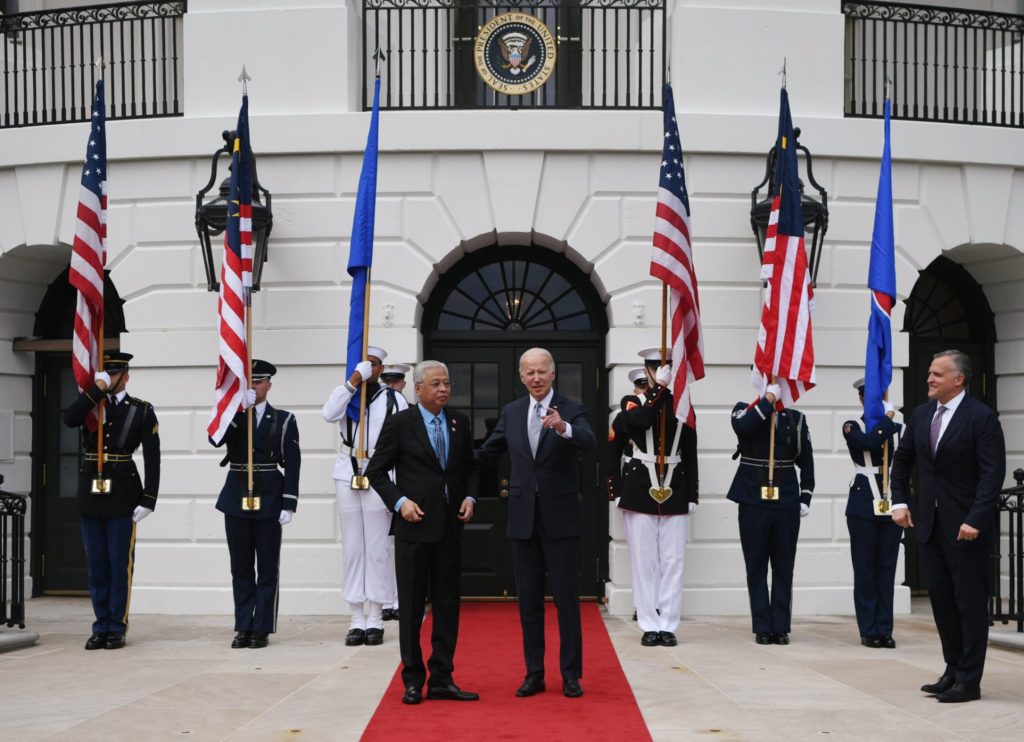
The arrival of Malaysian Prime Minister, Datuk Seri Ismail Sabri Yaakob at the White House, Washington D.C.. He was warmly welcomed by the President of the United States (USA), Joe Biden Thursday night. He was at the White House to attend a dinner hosted by Biden in conjunction with the ASEAN-US Special Summit in Washington D.C. Photo courtesy of PMO Facebook.
By Manik Mehta
NEW YORK, May 13 – Journalists here in the US from a number of Southeast Asian countries to cover the US-ASEAN Special Summit in Washington on May 12 and 13, have been busy talking to representatives of the American business community, think tanks, research scholars and the diaspora members of a number of Southeast Asian countries in the United States to get their insights on this gargantuan summit of 10 ASEAN nations and the host United States.
While the Russia/Ukraine crisis has indeed cast a shadow over other happenings around the world, the Biden administration is by no means abandoning its focus on the Indo-Pacific to not only strengthen its footprint in the vast geography to counter the growing rise of China but also intensify its economic interests.
“Business and trade will figure as much as the China factor which, frankly, also weighs heavily on a number of ASEAN countries … while the latter tend to lean towards the US, they are also cautious not make moves that could anger Beijing,” says a Southeast Asia expert with a US think tank.
Any foreign leader visiting Washington these days can hardly escape the Ukraine question being popped up by the hosts. But the Biden administration is also aware that the Ukraine question cannot be put in a universal manner to all the ASEAN member states, given their different position on the issue. Myanmar and Vietnam, for instance, maintain close ties with Russia while Indonesia prefers to remain neutral and Singapore’s position, on the other hand, is somewhat aligned with that of the U.S., the EU and Japan. But the US has been asking Vietnam to distance itself from Russia, while Indonesia and Thailand are urged to give up their neutrality and take a stand critical of Russia
One of the pet projects of the Biden administration is the Indo-Pacific Economic Framework (IPEF), an over-arching programme that will underscore trade and economic ties. However, the Asian countries have already moved closer, in their economic relationship, to each other through a dense partnership under the Comprehensive and Progressive agreement on Trans-Pacific Partnership (CPTPP), from which the USA recklessly withdrew under the Trump administration.
Both the ASEAN and the US might give the IPEF an informal character without impinging on the other binding agreements which the ASEAN countries have already entered into. However, the IPEF might well turn out to be a vaguely-worded statement of intent allowing the ASEAN members enough room to maneuver within the framework. Nevertheless, the US will have to come up with something more substantive than the IPEF if it has to demonstrate its seriousness to assume the leadership role.
A thorny issue that has been – and will be – discussed is Myanmar whose human rights’ record is a source of concern not just for the US but also for most ASEAN states. Washington has been monitoring the – largely unsuccessful – moves by ASEAN to bring about improvements in Myanmar since the February 2021 military coup. Myanmar’s ethnic conflict has also led to destruction of infrastructure, including hospitals which lack facilities to combat the proliferating pandemic. Myanmar’s leader has not been invited to Washington.
The attitude of Cambodia, which chairs the ASEAN this year, and the Cambodian Prime Minister Hun Sen, who has practically ignored the Myanmar situation, has irked many in the US. The Biden administration has been quietly prodding the ASEAN leaders to pressurize the Myanmar junta to stop the human rights’ repression.
The COVID-19 pandemic has figured in the US-ASEAN meetings; indeed, last year’s virtual summit saw President Joe Biden pledging funds, though modest, for aiding ASEAN’s COVID efforts. However, ASEAN states also buy U.S. and European.
US experts say that there is a growing disenchantment with China and it is generally recognized by the ASEAN countries that they need to maintain a balance between China and the US. The Biden administration, sensing China’s growing unpopularity and the latter’s domestic economic problems, coupled with the zero-tolerance policy against COVID, has intensified its courtship of the ASEAN countries which, in the recent past, appeared to be moving into China’s orbit of Indonesia, the Philippines and Vietnam.
They are seen as potential strategic partners of the US in the latter’s efforts to counter China’s rising power in the Indo-Pacific and, particularly, in the South China Sea. The Philippines will not be represented by its leader as it goes through the leadership transition following the May 9 elections. .
This is the first time that the ASEAN leaders are gathering collectively at the White House; former President Barack Obama was the last US leader to host them at Sunnylands, California, in 2016.
After the summit, from May 20-24, Biden will visit two Asian countries – South Korea and Japan – which will include meetings with other leaders of the Quad grouping such as Australia, India and Japan which, like the US, have concerns about China’s rising influence in the region and the world.
Kate Rebholz, acting US ambassador to ASEAN, noted during a discussion at Washington’s Stimson Center that the summit would result in “an ambitious and forward-looking U.S.-ASEAN vision statement” and new initiatives, including partnerships in public health, climate and economic growth. But other experts and analysts see the most significant thing about the summit is its evolving into a “comprehensive” strategic partnership.
But the fact the summit was being held at all despite the huge distraction of Ukraine, is seen by many as an attempt to galvanize support against China which, Washington says, remains its key long-term foreign policy challenge, regardless of Russia’s actions.
–WE